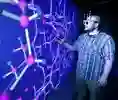




The world is ever changing. And it needs skilled, hands-on people to keep it turning. That’s where you come in.
Learn to programme and construct robotic systems that can interact with the real world on this hands-on course. You’ll discover how robots and Artificial Intelligence (AI) are transforming our lives. And access industry-standard facilities such as our robotics lab with DJI Drones, Turtlebot3 mobile robots and humanoids like Baxter, Nao and Pepper.
You can boost your CV by taking a paid placement year and gaining outstanding tech industry experience as a recognised part of your degree.
About this course
Robots and AI are the present and the future, transforming the way we live and work.
This course gives you a solid background in computer science and programming. You’ll gain experience of the AI tools that give robots the ability to autonomously operate in the real world. Develop advanced skills in Python, an industry-standard language. And study the increasing impact of AI and robotics on society.
Discover how robots work and how to program them in our robotics lab. Where you’ll also digitally fabricate 3D models and parts for your robotic systems. You’ll have access to our other industry-standard equipment too, including high-performance workstations, gigabit networking, a 3D immersive cube, motion capture, AR, VR and MR.
Benefit from our strong industry links with frequent talks by experts in the trade. And boost your skills in the real world by taking a paid placement year as part of your course.
Get involved with our extra-curricular opportunities and compete in international events like the Microsoft Imagine Cup. Or rise to the challenge of creating a computer game over a weekend in our Three Thing Game.
It takes a human to harness the power of AI.
Module options
Our five undergraduate Computer Science courses share the same compulsory modules in the first year. This gives you a foundation of knowledge across the whole subject area and the chance to explore what really interests you. You're then better placed to choose your modules in the later years of our BSc Computer Science, or switch to a different pathway to specialise in games programming, software engineering, robotics or AI.
Filters
Programming Portfolio
Gain the practical knowledge to design, implement and test algorithms. The module uses lectures to deliver concepts, a practice lab to apply the programming concepts learnt by developing programs to solve problems. You will take part in hands-on practical assessments, which will enable you to acquire extensive programming skills in an industry standard programming language. We will support you whether you are new to programming or have existing skills.
core
40 credits
Algorithms and Data Structures
Start to think like a computer. This module explores logic, data storage and algorithms with the use of practical demonstrations and activities. Operating in parallel with programming-focused modules, we will develop a toolkit of key concepts from a theoretical (non-code) perspective, facilitating a better understanding of these fundamentals. Topics to expect include pseudocode, state machines, essential keywords, common data structures, sort algorithms and search algorithms. You will learn methods to analyse and compare algorithms and their constituent parts in order that you may better design, evaluate and develop effective, efficient and performant software solutions.
compulsory
20 credits
Computational Thinking
This module, Computational Thinking, is essential for developing computer-based solutions. This module will enable you to develop your knowledge and understanding of the key mathematical underpinnings of computer science, to aid you in problem solving and programming. The development of your competence in logic, mathematics and statistics will also provide evidence of your numeracy and more advanced skills and is valued by employers.
compulsory
20 credits
Architectures, Operating Systems and the Cloud
In this module you will explore the fundamental properties of computers that allow them to execute programs. You will learn about how computers are made to work in hardware and simulation (virtual machines). A collection of virtual machines is a cloud, and this module allows you to get experience with the development of your own cloud using appropriate platforms.
compulsory
20 credits
Professional Development
Employers want much more than discipline-specific skills. This module sets you up to grow your professional skills and awareness, when working both individually and as part of a team. Develop your appreciation of the challenges within the sector, and how technology can help to solve worldwide issues. Begin a personal portfolio that you will add to over your degree. Work as part of a team to produce a design prototype, demonstrating your personal professional development. Through researching your discipline, you will understand the range of career roles available and what you need to do to progress in them.
compulsory
20 credits
Robotic Foundations
Robots are a combination of electronic, mechanical and computer systems. This module focuses on the underlying science and technologies of structures, actuators and sensors which make up the component parts of robots. The module provides a hands-on opportunity to the students to work on industry-standard robot simulation tools to safely model real-world robots and to simulate their behaviour in different scenarios – knowledge and software that can then be ported to real-world systems. Alongside this, the module provides an opportunity of developing diversity of soft skills including but not limited to; team-working, project planning, report writing.
core
40 credits
Artificial Intelligence
Data is one of the 21st century’s most valuable commodities. In this module you will learn how to analyse, validate and interpret it to inform decision making. You will implement artificial intelligence techniques to solve a real world problem. Nationally, there is a widely recognised shortage of qualified Artificial Intelligence (AI) and data scientists to meet the needs of industry.
compulsory
20 credits
Connected Devices and IoT
Everything is connected. Whether components of a robot, smart homes or cities, many sensors and subsystems must work together and communicate with each other flawlessly and at high speed to achieve their goals. This module will give you a practical introduction to the options available and the tools and techniques needed to make multiple software and hardware systems integrate together. You’ll examine the abilities of wired and wireless communication systems, learn where and when particular systems are appropriate, learn about the Internet of Things and implement examples.
compulsory
20 credits
Data Analysis and Visualisation
Data analytics has rapidly become a part of all of our lives, and is an increasingly sought-after skill in the jobs market. In this module you'll learn the theoretical and practical skills to analyse any dataset independently, starting from exploratory analysis of a new dataset for hypothesis finding, over-choosing and comparing different algorithms, and presenting and explaining your results quantitatively and visually. You will learn to train models of different complexities that can make predictions or uncover hidden patterns in data, making responsible and fair decisions that can help improve our lives.
compulsory
20 credits
Our facilities


Watchlist
BSc Robotics and Artificial Intelligence
Course overview
2 mins
The impact of AI
Course Highlight
2 mins
Rand Nessif
Unsame Stories
2 mins
See our incredible labs
Course Highlight
2 mins
Featured academics
Our teaching is linked to our research in simulation, visualisation, dependable systems, robotics, 3D printing and mobile and distributed computing.
You’ll be at the forefront of developments in this rapidly growing field.

Dr Jamshed Iqbal
Senior Lecturer
Jamshed’s technical expertise, industrial research and teaching experience lay within the fields of robotics, mechatronics and control systems. He leads our Mechatronics and Robotics programme.

Dr Muhammad Khalid
Lecturer
Muhammed previously worked on a project aimed at improving safety in agriculture utilising autonomous robotic systems. As well as robotics, his research interests include autonomous vehicles and AI-based decision making in IoT devices.
Entry Requirements
What do I need?
This course is currently available through Clearing, which means our entry requirements are a bit different to what they would normally be.
At Hull, you're a name not a number. During Clearing, we look at all of your qualifications and experience, not just your academic grades. We may be able to offer you a place whatever your situation. Get started by completing our eligibility checker, and find out immediately if you could study at the University of Hull.
Have questions? Our admissions team will be happy to help.
Fees & Funding
How much is it?

Future prospects
The experience and technical expertise you’ll gain will put you in high demand when it’s time to enter the job market in this fast-moving industry. You’ll create a professional portfolio of work throughout your degree to demonstrate your skills to employers.
Robotics and AI touch upon almost every aspect of modern life, creating a variety of career opportunities. You could go on to develop the latest technology – from driverless cars to drones, space vehicles to automated production lines and technology-assisted clothing.
Graduate careers include robotics software developer, robotics and embedded software engineer, AI developer, simulation engineer, autonomous vehicles architect and R&D.
Become part of the next generation of futuremakers
Like what you've seen? Then it's time to apply.
The standard way is to apply through UCAS. This will give you the chance to showcase your skills qualities and passion for the subject, as well as providing us with your academic qualifications.
Not ready to apply yet?
Visit our next Open Day, and see all that the University of Hull has to offer. Talk to our lecturers about your subject, find out what university is really like from our current students, and take a tour of our beautiful campus and amazing facilities.
You may also be interested in...
90% employability (Computer Science) UK domicile full-time first degree leavers; Higher Education Graduate Outcomes statistics, for the academic year 2022/23, published by the Higher Education Statistics Agency June 2025.
All modules presented on this course page are subject to availability and this list may change at any time.